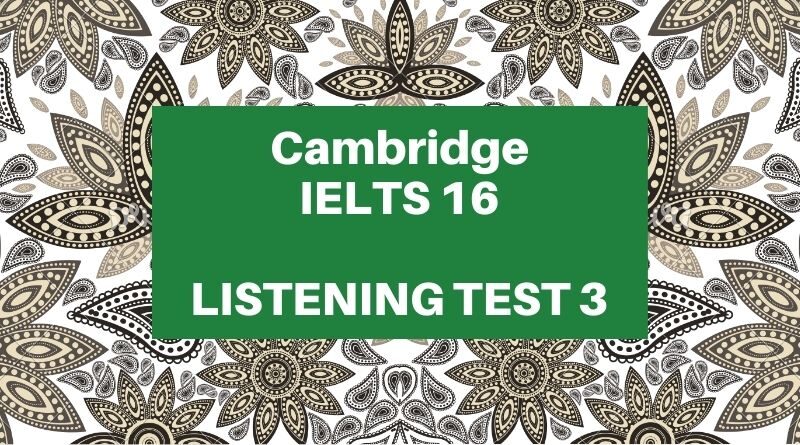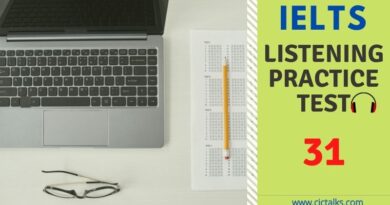IELTS 16 Listening Test – 03
Camb IELTS 16 Listening Test 3 [Junior cycle camp, Hand knitting] Answers, Audio, PDF: This is the 53rd test of our ‘LISTENING 200+🎧 Practice Test Series’.
This test is divided into four parts – Part 1, 2, 3 and 4.
Part 1 is about Junior cycle camp.
Part 2 is about working in Agriculture sector.
Part 3 is about Artificial sweeteners.
Part 4 is about Hand knitting.
You can check your answers & calculate your IELTS Listening academic/general band scores at the end of this test. It is strongly advised to print the IELTS Listening answer sheet and mark your answers on the sheet as well.

The information in a table is always read from left to right. Notice that there is often a title or a heading at the top of the table to give you more information.
Camb IELTS 16 Listening Test 3 [with Answers]
IELTS 16 Junior cycle camp [Part 1]
Questions 1-10
Complete the notes below.
Write ONE WORD AND/OR A NUMBER for each answer.
Junior Cycle Camp
| The course focuses on skills and safety. ☑️ Charlie would be placed in level 5. ☑️ First of all, children at this level are taken to practise in a (1) …………………. . Instructors ☑️ Instructors wear (2) …………………. shirts. ☑️ A (3) …………………. is required and training is given. Classes ☑️ The size of the class is limited. ☑️ There are quiet times during the morning for a (4) …………………. or a game. ☑️ Classes are held even if there is (5) …………………. . What to bring ☑️ a change of clothing ☑️ a (6) …………………. ☑️ shoes (not sandals) ☑️ Charlie’s (7) …………………. Day 1 ☑️ Charlie should arrive at 9.20 am on the first day. ☑️ Before the class, his (8) …………………. will be checked. ☑️ He should then go to the (9) …………………. to meet his class instructor. Cost ☑️ The course costs (10) $…………………. per week. |
Camb IELTS 16 Listening Test 3 [Part 2]
Questions 11-12
Choose TWO letters, A-E.
According to Megan, what are the TWO main advantages of working in the agriculture and horticulture sectors?
| A. the active lifestyle B. the above-average salaries C. the flexible working opportunities D. the opportunities for overseas travel E. the chance to be in a natural environment |
Questions 13-14
Choose TWO letters, A-E.
Which TWO of the following are likely to be disadvantages for people working outdoors?
| A. the increasing risk of accidents B. being in a very quiet location C. difficult weather conditions at times D. the cost of housing E. the level of physical fitness required |
Questions 15-20
Choose SIX answers from the box and write the correct letter, A-H, next to questions 15-20.
What information does Megan give about each of the following job opportunities?
| Information A. not a permanent job B. involves leading a team C. experience not essential D. intensive work but also fun E. chance to earn more through overtime F. chance for rapid promotion G. accommodation available H. local travel involved |
| Job opportunities | |
|---|---|
| 15) Fresh food commercial manager | ……………………. |
| 16) Agronomist | ……………………. |
| 17) Fresh produce buyer | ……………………. |
| 18) Garden centre sales manager | ……………………. |
| 19) Tree technician | ……………………. |
| 20) Farm worker | ……………………. |
IELTS 16 Listening Test 3 Artificial Sweetners [Part 3]
Questions 21-22
Choose TWO letters, A-E.
Which TWO points does Adam make about his experiment on artificial sweetners?
| A. The results were what he had predicted. B. The experiment was simple to set up. C. A large sample of people was tested. D. The subjects were unaware of what they were drinking. E. The test was repeated several times for each person. |
Questions 23-24
Choose TWO letters, A-E.
Which TWO problems did Rosie have when measuring the fat content of nuts?
| A. She used the wrong sort of nuts. B. She used an unsuitable chemical. C. She did not grind the nuts finely enough. D. The information on the nut package was incorrect. E. The weighing scales may have been unsuitable. |
Questions 25-30
Choose the correct letter – A, B or C.
25) Adam suggests that restaurants could reduce obesity if their menus
A. offered fewer options
B. had more low-calorie foods
C. were organised in a particular way
26) The students agree that food manufacturers deliberately
A. make calorie counts hard to understand
B. fail to provide accurate calorie counts
C. use ineffective methods to reduce calories
27) What does Rosie say about levels of exercise in England?
A. The amount recommended is much too low.
B. Most people overestimate how much they do.
C. Women now exercise more than they used to.
28) Adam refers to the location and width of stairs in a train station to illustrate
A. practical changes that can influence people’s behaviour.
B. methods of helping people who have mobility problems.
C. ways of preventing accidents by controlling crowd movement.
29) What do the students agree about including reference to exercise in their presentation?
A. They should probably leave it out.
B. They need to do more research on it.
C. They should discuss this with their tutor.
30) What are the students going to do next for their presentation?
A. prepare some slides for it
B. find out how long they have for it
C. decide on its content and organisation
Camb 16 Listening 3 Hand Knitting [Part 4]
Questions 31-40
Complete the notes below.
Write ONE WORD ONLY for each answer.
Hand Knitting
Interest in knitting: ☑️ Knitting has a long history around the world. ☑️ We imagine someone like a (31) …………………. knitting. ☑️ A (32) …………………. ago, knitting was expected to disappear. ☑️ The no. of knitting classes is now increasing. ☑️ People are buying more (33) …………………. for knitting nowadays. Benefits of knitting: ☑️ gives support in times of (34) …………………. difficulty ☑️ requires only (35) …………………. skills and little money to start ☑️ reduces stress in busy life Early knitting: ☑️ The origins are not known. ☑️ Findings show early knitted items to be (36) …………………. in shape. ☑️ The first needles were made of natural materials such as wood and (37) …………………. . ☑️ Early yarns felt (38) …………………. to touch. ☑️ Wool became the most popular yarn for spinning. ☑️ Geographical areas had their own (39) …………………. of knitting. ☑️ Everyday tasks like looking after (40) …………………. were done while knitting. |
- PARK
- BLUE
- REFERENCE
- STORY
- RAIN
- SNACK
- MEDICATION
- HELMET
- TENT
- 199
- A or C
- A or C
- B or C
- B or C
- D
- F
- A
- H
- C
- G
- C or D
- C or D
- C or E
- C or E
- C
- A
- B
- A
- A
- C
- GRANDMOTHER
- DECADE
- EQUIPMENT
- ECONOMIC
- BASIC
- ROUND
- BONE
- ROUGH
- STYLE
- SHEEP
About IELTS 16 Listening Test 3 with Answers
This Cambridge IELTS 16 Listening Test 4 [Junior cycle camp] Answers, Audio, PDF falls under ‘Easy’ category. So, if you are scoring 36+/40 in this practice test you are highly likely to get band 7 and above in the real exam setting.
I hope you find this 53rd test of our online ‘LISTENING 200+🎧 Practice Test Series’ useful.
Need the pdf copy & official transcript of this test? Please comment below.


![IELTS Listening general practice [TEST 34]](https://cictalks.com/wp-content/uploads/2021/04/IELTS-Listening-general-practice-TEST-34-390x205.jpeg)
